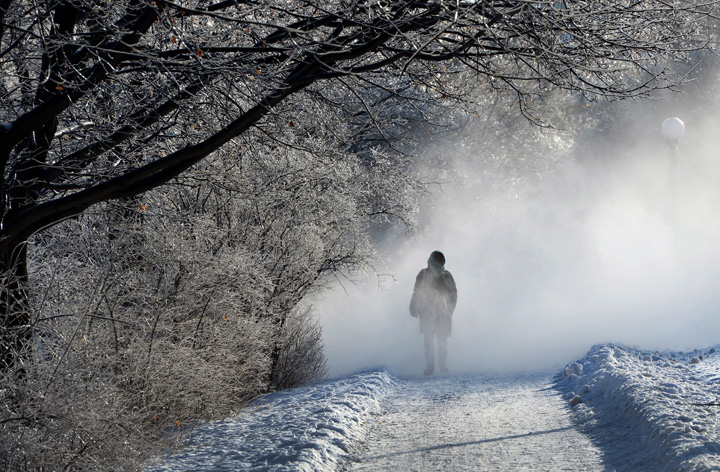TORONTO – For most Canadians (not you, British Columbia), unless you’re a skier or snowboarder (and even then), you’re probably tired of the particularly cold winters we’ve been having. Well, good news: thanks to an impending El Nino, next winter may be warmer.

Of course, we heard that last year, right?
READ MORE: El Nino: What it is and why it matters
An El Nino (meaning “little boy” in Spanish) is characterized by unusually warm water in the equatorial Pacific Ocean. That warming — by just as much as half a degree over three months — can significantly alter weather patterns around the globe, including Canada.
The problem is, like a typical child, last winter El Nino didn’t quite behave the way forecasters had anticipated.
“The kind of surprise is that last year’s didn’t develop,” said David Phillips, senior climatologist with Environment Canada. “We know the one half of it developed — that is the ocean effects — but the problem is there was no coupling with the atmosphere. There was no connection. And that surprised a lot of people.”
But now, the depth of warmer water, the ocean temperature and the atmosphere are all playing along.
On Thursday, the National Oceanic and Atmospheric Administration’s Climate Prediction Center released an El Nino advisory, forecasting a 90 per cent chance that the weak El Nino will continue through the summer and an 80 per cent chance or greater that it will last throughout the year.
Typically El Ninos occur about ever five years or so.
There were some El Nino effects in December, but it didn’t quite develop. That got people talking about the “double El Nino,” anticipating that 2015 would see an El Nino year as well. However, it may just be part of one long phenomenon.
WATCH: Will 2015 bring a double El Nino?
So does this mean we will see that warmer winter we were told to expect last year?
“We still have to get through summer,” said Mike Halpert, acting director of NOAA’s Climate Prediction Center. “What happens next winter will largely depend…on how strong this event becomes.”
Halpert said that NOAA is much more confident in the forecast than it was last month, but that it may take another month or two before they can say for certain that this is indeed a strong El Nino event. And there’s no guarantee it’ll stick around until the winter.
El Nino tends to bring warmer weather to Canada and the northern United States. It brings rainy conditions to the U.S. south — good news for drought-stricken California. But for other parts of the world, it could mean drier conditions and drought or even wetter conditions and dangerous floods.
Phillips said that typically, strong El Ninos or “super El Ninos” occur about once every 15 years. Remember the Ice Storm of 1998? That occurred during the last strong El Nino year in 1997-98.
PHOTO GALLERY: The global effects of El Nino
If the currently weak to moderate El Nino conditions were to strengthen, that would mean Canada would experience milder weather coast to coast. That’s bad news for those in B.C. who experienced the warmest winter on record last year, but good news for those in central and eastern Canada who saw the second-coldest back-to-back winters in 68 years.
Is there a chance that another warm winter may avoid us again?
“My sense is that this is not a false call. This is not like last year,” Phillips said. “This one is already into the books as an El Nino. The issue then is only one of strength.”
Halpert agreed.
“Everyone’s in agreement that it’s here. What really matters, at least for us in North America, is will it still be here and still impact things come next winter?”
And there’s no way of knowing exactly how an El Nino will behave — each one is different.
The big wild card, Phillips said, is the Arctic. During the 1997-98 El Nino, the Arctic hadn’t lost so much sea ice and was thicker. And just how that will influence the effects of the El Nino aren’t known.
“The world is different now since the last El Nino.”
So, as the months move on, all eyes will be on the El Nino. Especially for those in central and eastern Canada.
“Winter is still a long way off,” said Halpert.







Comments